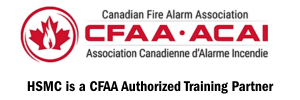Continuing Education for Fire Alarm Technicians
HSMC offers CFAA-approved, continuing education opportunities to help technicians meet CFAA credit requirements.
Our training helps improve job performance by equipping individuals with new skills and knowledge. Whether you’re aiming for compliance, career advancement, or simply recognition, we provide multiple ways to validate your learning.
Our courses include:
- CFAA Category 1 Credits
- CFAA Category 2 Credits
- CFAA Certificates of Completion
Registered CFAA Technicians need 8 credits per year, with at least 2 credits from Category 1 courses. If you’re unsure how many credits you need, contact CFAA.
This program does not require approval under the Ontario Career Colleges Act, 2005
Instructor Led, In-Person & Online
- Informal classroom setting
- Limited class sizes (max. 35 participants)
- Detailed training manuals with presentation notes
- Expert instruction from industry professionals
Critical Updates, 2026
Category 1, Credits 8
This session goes beyond basic skill-building — it equips you with actionable knowledge to enhance job performance, meet compliance standards, and pursue career growth. Whether you are aiming for regulatory certification, professional advancement, or recognition within your field, our training provides multiple ways to validate and showcase your expertise.
Learning Objectives
- Understand the change Ontario amendments to the NBC 2020 (Compendium)
- Understand the change procedures required under that code
- Understand procedures required under NFC 2020
- Understand installation, verification, inspection and integrate systems testing changes due to change updated standards references in Builiding and Fire Code updates
Date:
Asynchronous, Online
- Learn at your own pace.
- Access to learning 24 x 7.
- Certificates of Completion provided immediately after successful completion.
- Videos and Test
Explore our selection of self-paced online courses, designed for flexible learning at your convenience.
Start learning online today
Follow these instructions to enroll and start your online learning:
-
- Create or log into your account
- Click “Take a Lesson and Test”
- Choose your course by browsing through the categories
- Follow the on-screen instructions to start


